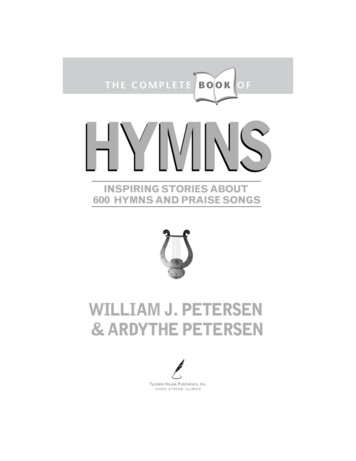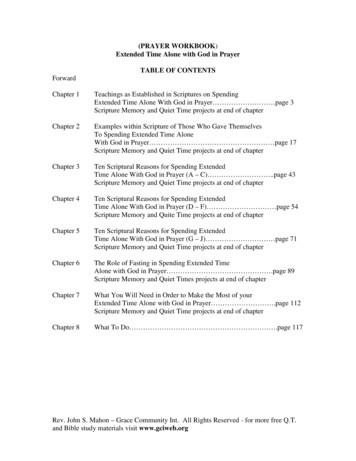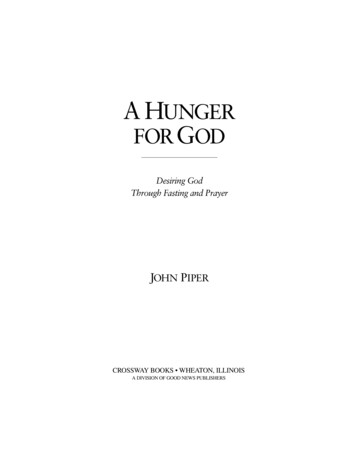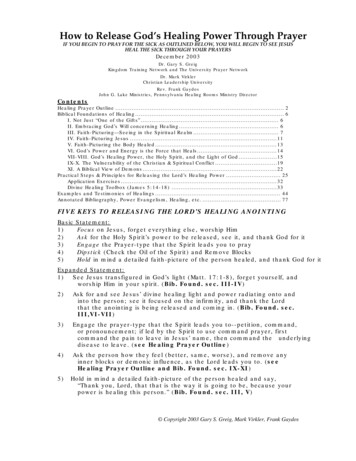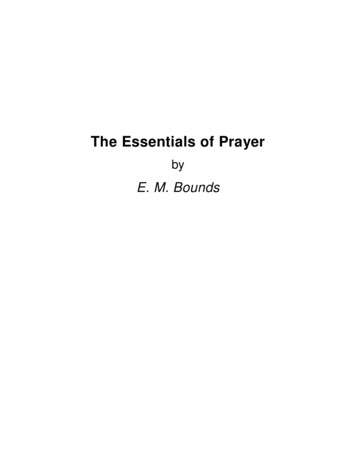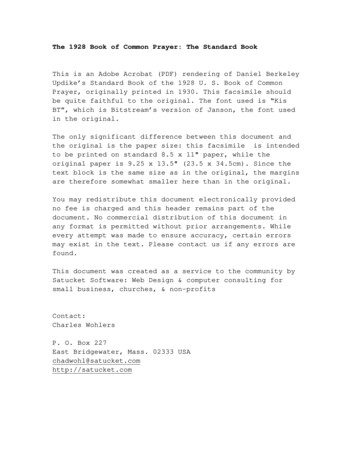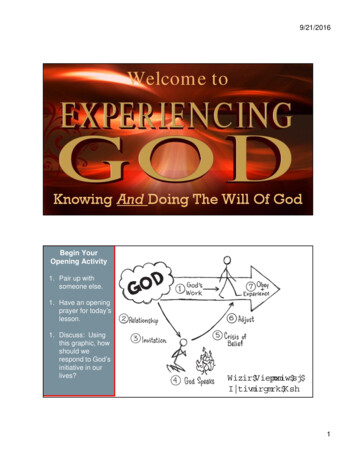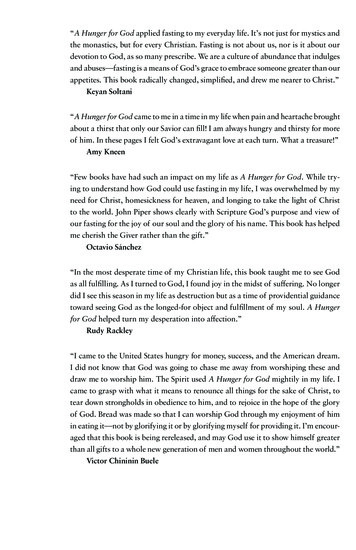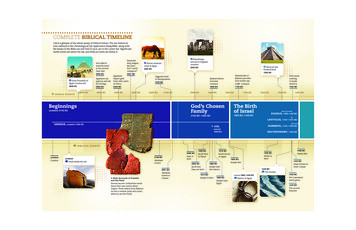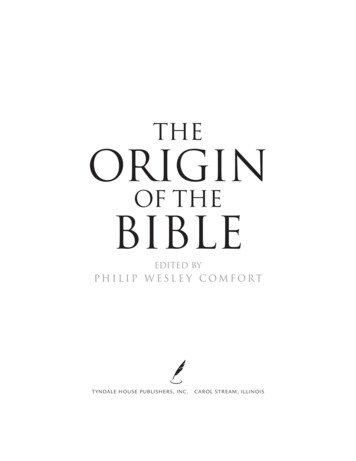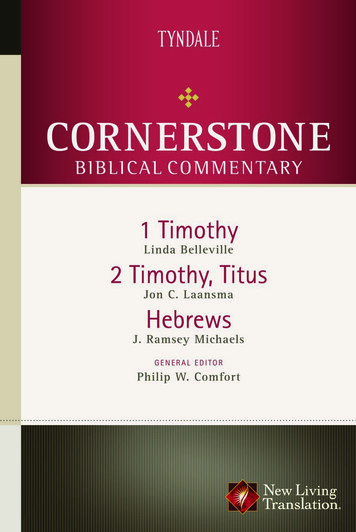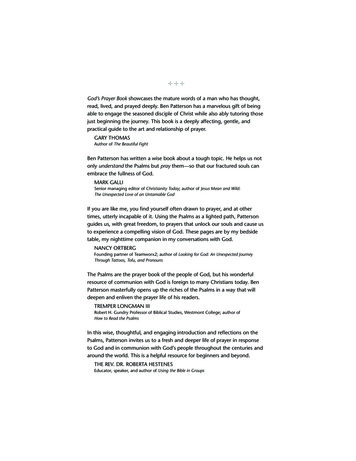
Transcription
God’s Prayer Book showcases the mature words of a man who has thought,read, lived, and prayed deeply. Ben Patterson has a marvelous gift of beingable to engage the seasoned disciple of Christ while also ably tutoring thosejust beginning the journey. This book is a deeply affecting, gentle, andpractical guide to the art and relationship of prayer.GARY THOMASAuthor of The Beautiful FightBen Patterson has written a wise book about a tough topic. He helps us notonly understand the Psalms but pray them—so that our fractured souls canembrace the fullness of God.MARK GALLISenior managing editor of Christianity Today;y author of Jesus Mean and Wild:The Unexpected Love of an Untamable GodIf you are like me, you find yourself often drawn to prayer, and at othertimes, utterly incapable of it. Using the Psalms as a lighted path, Pattersonguides us, with great freedom, to prayers that unlock our souls and cause usto experience a compelling vision of God. These pages are by my bedsidetable, my nighttime companion in my conversations with God.NANCY ORTBERGFounding partner of Teamworx2; author of Looking for God: An Unexpected JourneyThrough Tattoos, Tofu, and PronounsThe Psalms are the prayer book of the people of God, but his wonderfulresource of communion with God is foreign to many Christians today. BenPatterson masterfully opens up the riches of the Psalms in a way that willdeepen and enliven the prayer life of his readers.TREMPER LONGMAN IIIRobert H. Gundry Professor of Biblical Studies, Westmont College; author ofHow to Read the PsalmsIn this wise, thoughtful, and engaging introduction and reflections on thePsalms, Patterson invites us to a fresh and deeper life of prayer in responseto God and in communion with God’s people throughout the centuries andaround the world. This is a helpful resource for beginners and beyond.THE REV. DR. ROBERTA HESTENESEducator, speaker, and author of Using the Bible in GroupsGod.indd i7/22/2008 6:39:24 AM
THE POWERAND PLEASURE OFPRAYING THE PSALMSGOD’SPRAYERBOOKBENPATTERSON An Imprint of Tyndale House Publishers, IncInc.,.,Carol Stream, IllinoisGod.indd iii7/22/2008 8:16:04 AM
Visit Tyndale’s exciting Web site at www.tyndale.comTYNDALEE is a registered trademark of Tyndale House Publishers, Inc.SaltRiver and the SaltRiver logo are registered trademarks of Tyndale HousePublishers, Inc.God’s Prayer Book: The Power and Pleasure of Praying the PsalmsCopyright 2008 by Ben Patterson. All rights reserved.Cover background image copyright by Bryce Kroll/iStockphoto. All rightsreserved.Cover photo of tree copyright by Peter Zelei/iStockphoto. All rights reserved.Cover and interior grunge border copyright by Gordon/Shutterstock. All rightsreserved.Interior artwork copyright by Natasha R. Graham/Shutterstock. All rightsreserved.Author photo copyright 2006 by M. Bradley Elliott. All rights reserved.Designed by Beth SparkmanPublished in association with the literary agency of Credo Communications, LLC,Grand Rapids, MI 49525; www.credocommunications.net.Unless otherwise indicated, all Scripture quotations are taken from the HolyBible, New Living Translation, copyright 1996, 2004, 2007 by Tyndale HouseFoundation. Used by permission of Tyndale House Publishers, Inc., Carol Stream,Illinois 60188. All rights reserved.Scripture quotations marked The Message are taken from The Messagee byEugene H. Peterson, copyright 1993, 1994, 1995, 1996, 2000, 2001, 2002.Used by permission of NavPress Publishing Group. All rights reserved.Scripture quotations marked NIV are taken from the HOLY BIBLE, NEWINTERNATIONAL VERSION . NIV . Copyright 1973, 1978, 1984 byInternational Bible Society. Used by permission of Zondervan. All rights reserved.Scripture quotations marked ESV are from The Holy Bible, English StandardVersion , copyright 2001 by Crossway Bibles, a publishing ministry of GoodNews Publishers. Used by permission. All rights reserved.Library of Congress Cataloging-in-Publication DataPatterson, Ben, date.God's prayer book : the power and pleasure of praying the psalms / BenPatterson.p. cm.Includes bibliographical references and index.ISBN-13: 978-1-4143-1665-9 (sc)ISBN-10: 1-4143-1665-8 (sc)1. Bible. O.T. Psalms—Criticism, interpretation, etc. 2. Prayer—Christianity.I. Title.BS1430.52.P38 2008223'.2077—dc222008021253Printed in the United States of America147God.indd iv13612511410309 08217/22/2008 6:40:01 AM
D E D I C AT I O NTo Lauretta, my dearest, my wife, my prayer companioon,my wise editor, and fountain of insights into the Psalmms.You have prayed with me through these psalms everyystep of the way, and through a marriage whose gracee,richness, and hilarity I could not have imagined wheenwe began this pilgrimage together thirty-seven years aggo.In his light we have seen light.To the good folks at Santa Barbara Community Churrchand to the finest pastors I know: Reed, Steve, Kelly, anndMike. You great people have met with me weekly everyTuesday morning at 6:45 for six years to learn prayeer!This is your book too.SOLI DEO GLORIA.God.indd v7/22/2008 6:40:01 AM
God.indd vi7/22/2008 6:40:07 AM
CONTENTSTHE PSALMS: MUSIC TO GOD’S EARS . . . 1PSALMS AND DEVOTIONALSGod.indd viiPSALM 1 . . . . . . . 23PSALM 57 . . . . . . 153PSALM 2 . . . . . . . 27PSALM 63 . . . . . . 158PSALM 3 . . . . . . . 31PSALM 67 . . . . . . 161PSALM 4 . . . . . . . 35PSALM 69 . . . . . . 164PSALM 5 . . . . . . . 40PSALM 70 . . . . . . 171PSALM 6 . . . . . . . 45PSALM 71 . . . . . . 174PSALM 7 . . . . . . . 49PSALM 73 . . . . . . 178PSALM 8 . . . . . . . 54PSALM 75 . . . . . . 183PSALM 12 . . . . . . 58PSALM 76 . . . . . . 187PSALM 14 . . . . . . 62PSALM 77 . . . . . . 191PSALM 16 . . . . . . 66PSALM 78 . . . . . . 196PSALM 19 . . . . . . 70PSALM 83 . . . . . . 204PSALM 22 . . . . . . 75PSALM 84 . . . . . . 209PSALM 23 . . . . . . 81PSALM 87 . . . . . . 213PSALM 24 . . . . . . 85PSALM 88 . . . . . . 217PSALM 27 . . . . . . 89PSALM 90 . . . . . . 222PSALM 30 . . . . . . 94PSALM 91 . . . . . . 227PSALM 31 . . . . . . 98PSALM 96 . . . . . . 233PSALM 32 . . . . . . 103PSALM 100 . . . . . 237PSALM 36 . . . . . . 107PSALM 102 . . . . . 240PSALM 37 . . . . . . 111PSALM 103 . . . . . 245PSALM 40 . . . . . . 117PSALM 119 . . . . . 250PSALM 42 . . . . . . 122PSALM 120 . . . . . 257PSALM 46 . . . . . . 128PSALM 121 . . . . . 261PSALM 51 . . . . . . 132PSALM 122 . . . . . 265PSALM 52 . . . . . . 137PSALM 123 . . . . . 269PSALM 53 . . . . . . 140PSALM 127 . . . . . 272PSALM 55 . . . . . . 144PSALM 128 . . . . . 276PSALM 56 . . . . . . 149PSALM 131 . . . . . 2807/22/2008 6:40:07 AM
PSALM 133 . . . . . 284PSALM 139 . . . . . 292PSALM 137 . . . . . 288PSALM 150 . . . . . 297NOTES . . . 303PSALMS FOR SPECIFIC NEEDS . . . 311God.indd viii7/22/2008 6:40:26 AM
THE PSALMS:MUSIC TO GOD’S EARSJames Boice said learning to pray is a little like learning to play the violinwith the virtuosos. No instrument sounds worse in the beginning stagesof learning; it’s all screech and scratch. But if the student is determined toplay well, he checks the program guide for the classical music station andnotes when the violin concertos will be aired. He buys the music scorefor each concerto and does his best to play along with the orchestra. Atfirst he sounds terrible. As time passes, however, he begins little by littleto sound more and more like the orchestra. But all along, as he groanson his instrument, the orchestra plays the music beautifully—his poorperformance is caught up and completed in the music of the masters. Soit is with us and prayer: By praying the Psalms back to God, we learn topray in tune with the Father, Son, and Holy Spirit.1It is no accident that the great prayers of the book of Psalms are alsosongs. They are the sheet music, the score and libretto of prayer. They arethe building blocks for the music of eternity. Better than the things wehthe sweetask God for in prayer is the God we pray to—and with—andmusic we make as we do.I am learning to pray in harmony with the Psalms, but I must admit Igot off to a slow start. I became a Christian at age ten, but it wasn’t untildecades later that the Psalms began to teach me to pray. So although I’mnow well into adulthood, you are reading the words of a new convert.I’m still wide eyed and breathless and maybe a little over the top withenthusiasm when I talk about their value. If I succeed with this book,you will be too.There is no better place in all of Scripture than the Psalms to learn to bewith God and to see with the eyes of faith the face of the One who longs toform us fully in his image. But the Psalms can be hard; they often stretchand perplex as they teach. How could it be otherwise? The Psalms are God’sprayer book, and they teach us to talk to God in his own language.Learning to pray is, in fact, like learning language. Most babies come1God.indd 17/22/2008 6:40:43 AM
into the world full of some very strong desires and feelings. They are quitecapable of expressing them in grunts, gurgles, squeals, and sobs. But it’s astretch to call their utterances language. It would be tragic if, at age eighteen, these noises were still all they knew about communication. And itwould be worse than tragic if at age eighteen they were still asking for thethings they wanted at three months, if their desires had not expanded andmatured as they learned to speak.The process of learning language is complex and wonderful; it beginswith a child listening to his or her parents, then mimicking and copyingwhat he or she hears. But a child is not a parrot, and very quickly mimicryturns to meaning. Words and ideas and desires match up with each otherand are woven together in syntax and grammar. With language comes aculture and a way of understanding the world and other people. It’s marvelous what happens when we learn language: We are taken out of ourselves towhat is beyond ourselves. It’s not just our informing the world who we are;it’s the world informing us who it is. It’s not just our telling others what wewant; it’s others telling us what they want. Language changes us, making usmore than we were when we were merely trying to express ourselves.Prayer, like language, begins with being able to hear. Prayer starts notwhen we speak to God but when God speaks to us. In the beginning wasthe Word; God’s word, not ours. Before all time, before you and I were,was the Word; the Light that gives light and life to everyone.2 There wouldbe no speech if God had not first spoken. We would have nothing to sayif God had not first said something to us. Ultimately then, all our prayersare answers to God’s prayer—his gracious Word of love to us! We love,and we pray, because he first loved us.3 That’s what Dietrich Bonhoefferwas referring to when he wrote, “The richness of the Word of God oughtto determine our prayer, not the poverty of our heart.”4 The Bible, thewritten Word of God, tells us what God wants, and more important, whatGod is like. It expresses his will and reveals his character. The relationshipbetween the Bible and prayer is profound. This is especially true when itcomes to the Psalms.Picture it this way: Children and other novices to the Scriptures havelong been told that the best way to find the book of Psalms, the longestbook in the Bible, is to put their fingers in the middle of the Bible—in itsheart, so to speak. What is the book of Psalms? It is a book of prayers. And2God.indd 27/22/2008 6:40:44 AM
the longest prayer in this longest book is Psalm 119, a prayer about God’sWord, the Scriptures. Prayer is at the heart of the Bible, and the Bible isin the heart of prayer.But that’s just a picture, an illustration of the relationship between thePsalms and prayer. Better is a demonstration—the prayer life of our LordJesus Christ. At the end of his life, as he hung dying on the cross, he went tothe Scriptures for his prayers—more specifically, to the Psalms. “My God,my God, why have you abandoned me?” (Matthew 27:46) is a quotationfrom Psalm 22:1. “Father, I entrust my spirit into your hands!” (Luke 23:46)comes from Psalm 31:5. At the point of his greatest anguish and extremity,Jesus turned to the Bible for his prayers. Charles Spurgeon reminds us that,when he most needed to pray, Jesus, the grand original thinker, saw no needto be original or extemporaneous. “How instructive is this great truth thatthe Incarnate Word lived on the Inspired Word! It was food to him, as it is tous; and . . . if Christ thus lived upon the Word of God, should not you and Ido the same? . . . I think it well worthy of your constant remembrance that,even in death, our blessed Master showed the ruling passion of his spirit, sothat his last words were a quotation from Scripture.”5As a devout Jew, Jesus considered the Psalms to be his prayer book. Aclose look at the Psalms shows the Lord’s Prayer—the prayer Jesus taughtus to pray—to be a summary and distillation of all the prayers that are tobe found in the heart of the Bible. It’s all there in the Psalms: prayer thatGod’s name be hallowed, that his rule be supreme and his will be done,that our needs be met and our sins forgiven, that we be kept safe from alldanger to soul and body.Martin Luther loved the Psalms. He called them “a little Bible,” because they contain, “set out in the briefest and most beautiful form, allthat is to be found in the Bible.”S i z i n g Up t he P sa l m sThe psalms that first got my attention were the psalms that always seemto be the right thing to pray, no matter the mood or situation. I call themthe “one size fits all” psalms, like the band on my adjustable baseball hat.These psalms can be expanded or contracted to fit any situation. For example, Psalm 103 is always the right thing to pray—always true, alwaysfitting, in every time and place:3God.indd 37/22/2008 6:40:44 AM
Let all that I am praise the Lord;with my whole heart, I will praise his holy name.Let all that I am praise the Lord;may I never forget the good things he does for me.He forgives all my sinsand heals all my diseases.He redeems me from deathand crowns me with love and tender mercies.He fills my life with good things.My youth is renewed like the eagle’s!Next came the psalms that seemed to fit my mood, that helped me saywhat I felt in the moment. I call them the “this size fits some” psalms.For instance, when I was feeling guilty, speechless with remorse, Psalm 51was a perfect fit. No matter how mute guilt had made me, I could openmy Bible and my mouth and say, “Have mercy on me, O God, becauseof your unfailing love. Because of your great compassion, blot out thestain of my sins.” Same with Psalm 130: “Lord, if you kept a record ofour sins, who, O Lord, could ever survive? But you offer forgiveness, thatwe might learn to fear you.” I literally couldn’t have said it better myself.If God held my sins against me, I’d be toast, dead meat, on the ash heap.But he forgives them all! Therefore I bow in abject, broken, and joyfulreverence. Psalms like these gave me confidence to speak to God when Ileast felt that I could. They still do.Adding up the psalms in the two categories I could relate to-—the“this size fits some” psalms, or the mood psalms; and the “one size fitsall” psalms—I didn’t know what to do with all the rest, which was mostof them. The most obvious example is Psalm 137, with its chilling lastline: “Happy is the one who takes your babies and smashes them againstthe rocks!” But that’s an extreme example. There were plenty of psalmsthat seemed too remote from my experience to have much to do with myprayer life. Psalm 87 has a good line or two if I was preaching a sermonthat needed to reference ancient Jewish attitudes toward Jerusalem, butotherwise I didn’t know how I could meaningfully pray personally,On the holy mountainstands the city founded by the Lord.4God.indd 47/22/2008 6:40:45 AM
He loves the city of Jerusalemmore than any other city in Israel.O city of God,what glorious things are said of you!I was really at a loss with psalms like Psalm 88. It doesn’t have onehappy thing to say about God or life and ends with, “You have takenaway my companions and loved ones. Darkness is my closest friend.”Those lines do not describe anything I have ever felt. Maybe they willsomeday, but so far, so good. But most problematic was Psalm 22, whichJesus quoted on the cross. I could preach this psalm as a meditation onthe sufferings of Christ, but I couldn’t get myself to pray, “My God, myGod, why have you abandoned me? Why are you so far away when Igroan for help?” Would it not be blasphemous for me, Ben Patterson, topray what only Jesus could pray?My enemies surround me like a pack of dogs;an evil gang closes in on me.They have pierced my hands and feet.I can count all my bones.My enemies stare at me and gloat.They divide my garments among themselvesand throw dice for my clothing.So there were a lot of psalms that seemed either alien or off limits.Most of them, actually. My slim psalm repertoire was a picture of thethinness of my prayer life—and my heart.It was also a picture of my shallow sense of Christian identity. I waswhat someone called a “yearbook Christian.” I came to the Psalms likeI came to my twenty-year high school reunion—thumbing through theindex of my old yearbook, looking only for the page numbers of the pictures of me and my friends, and ignoring the rest.Not M uch i n M y H e a rt to Po u r O utMy sophomore year in college, my friends and I decided to spend twohours in prayer for the salvation of the unsaved high school studentswe were working with. We purposed to storm heaven and bring down5God.indd 57/22/2008 6:40:45 AM
the blessings of God for these kids. One of us had a part-time job in achurch, so he asked the pastor if we could meet for prayer in the churchbuilding, a logical place to pray, one would think. The pastor told us justto show up some evening, any evening, and since my friend had a keyto the building, we could pray anywhere we wanted. But the night wecame to pray the church was bustling with activity, as various committeemeetings, youth programs, and choir practice were spread throughoutthe facility. It was busier and more full of distraction than our homes anddorm rooms. The only free space was a large janitor’s closet that smelledstrongly of detergent and disinfectant.So we gathered in that closet to pour out our hearts to God. Wehad two hours to do nothing but stand before the Lord’s throne andplead for the salvation of souls. We prayed every which way we knew:We praised God and confessed our sins and lifted up the names of allthe students we could think of. Then we praised and confessed and interceded some more. When we had prayed for everything and in everyway we could think of, over and over, I looked at my watch to see if wehad any time left. Just fifteen minutes had passed! The next one hourand forty-five minutes of prayer were the longest and slowest I had everexperienced.I came to pour out my heart to God and discovered that there wasn’tmuch in my heart to pour out. It would be years before I understoodwhy I saw prayer in the same way I saw the Psalms—only as a tool tohelp me ask God for what I wanted. The problem was that I wantedso little! What I didn’t understand was that learning to pray was learning to desire the things God wants to give, and then asking him forthem.The greatest enemy of prayer is not asking for too much of God butfor too little. We’re like Bontsha the Silent in the Yiddish writer IsaacPeretz’s sad tale. All his life he had been denied, passed over, oppressed,and forgotten. Chronic disappointment had robbed him of the abilityeven to dream or desire; he had come to expect nothing and want nothing. He was Bontsha the Silent.When he died he found himself standing before God in the court ofheaven. God smiled tenderly at Bontsha and said, “My son, all your joylesslife you had nothing. You lived without hope. But now, here in my pres6God.indd 67/22/2008 6:40:45 AM
ence, there is the fullness of joy, eternal pleasures at my right hand. Onlyask, and you shall receive. Anything, anything you want, shall be yours.”The little man with a shrunken soul squinted his eyes and ponderedthe offer. “Anything? Anything at all?” he asked suspiciously.“Yes,” said the Almighty. “Anything you want.”After a long pause, he said to the Almighty, “I would like a freshlybaked roll, with real butter.”Heaven wept.6 The greater tragedy of Bontsha’s life was not what hehad been denied, but what he had ceased to desire. God had been reduced to the size of a loaf of bread and butter. This man had become fartoo easily pleased.It wasn’t—and isn’t—that Bontsha’s desires or ours are unworthy toexpress to God in prayer. He is our loving and compassionate Father, andhe listens to all we say with a kind and wise heart. But he knows betterthan we do what we need—and better yet, he desires things for us thatwe may not even desire for ourselves.Mo re tha n a To o l f o r Se l f -E x p re ssio nPrayer is more than a tool for self-expression, a means to get God to giveus what we want. It is a means he uses to give us what he wants,7 andto teach us to want what he wants. Holy Scripture in general, and thePsalms in particular, teach us who God is and what he wants to give.When the members of his synagogue complained that the words ofthe liturgy did not express what they felt, Abraham Heschel, the greatphilosopher of religion, replied wisely and very biblically. He told themthat the liturgy wasn’t supposed to express what they felt; they were supposed to feel what the liturgy expressed. To be taught by the Bible topray is to learn to want and feel what the Bible expresses—to say what itmeans and mean what it says.Those who have practiced this kind of prayer over time make a surprising discovery: As they learn to feel what the Psalms express, theirhearts and desires are enlarged. They find that what they once regardedas strong desires were really weak, puerile little wishes, debased inklingsof what is good. Of course! Would not the God who made us in his ownimage understand better than we ever could what we really need? Andshouldn’t we ask him for it? As C. S. Lewis put it,7God.indd 77/22/2008 6:40:46 AM
Indeed, if we consider the unblushing promises of reward and thestaggering nature of the rewards promised in the Gospels, it wouldseem that Our Lord finds our desires not too strong, but tooweak. We are half-hearted creatures, fooling about with drink andsex and ambition when infinite joy is offered us, like an ignorantchild who wants to go on making mud pies in a slum because hecannot imagine what is meant by the offer of a holiday at the sea.We are far too easily pleased.8The best part of prayer is who you pray to. Answers to prayer are wonderful, but the Answerer is better. Spend enough time with Jesus, andyou’ll start to look and think and act like Jesus. Seeing is becoming. Thechurch father Irenaeus said, “The glory of God is man fully alive, andthe life of man is the vision of God.” It’s true: God is never more glorified than when we come alive to the vision of God. Prayer is anticipationand preparation for the great day promised in Scripture when we will seeChrist fully and “will be like him, for we will see him as he really is.”9Augustine prayed,How shall I call upon my God, my God and my Lord, since intruth when I call upon him I call him into myself? Is there anyplace within me where God can dwell? How can God come intome, God who made heaven and earth? O Lord my God, is thereany place in me that can contain you?10Is there any place in us that can contain God? No, there is not. Something must expand us for that to happen. The Psalms are God’s graciousgift to us to do that very thing. How sweet and kind of God to give usa book of prayers in his Word. This Word “is alive and powerful . . .sharper than the sharpest two-edged sword, cutting between soul andspirit, between joint and marrow. It exposes our innermost thoughts anddesires.”11 This is the very Word he gives us to pray in the Psalms!Paul coined a word to describe the character of Scripture: He saidit is “inspired by God” (2 Timothy 3:16). The Greek is literally “Godbreathed.” The breath of God permeates the Bible. The breath of God isthe Holy Spirit, the same Spirit who spoke light into darkness and turneddust into living beings made in the image of God. This is the Spirit who8God.indd 87/22/2008 6:40:46 AM
speaks to us in the Bible, making it “useful to teach us what is true andto make us realize what is wrong in our lives. It corrects us when we arewrong and teaches us to do what is right” (2 Timothy 3:16). With thisthought no doubt in mind, the poet George Herbert described prayeras “God’s breath in man returning to his birth.”12 The same Breath thatgives us breath to pray comes to us through the God-breathed Scriptures.What we inhale in the Word of God, we exhale in prayer. Like language,what comes in comes out, changing us in the process.Certainly, God invites us to pour out our hearts to him. The Psalms,which John Calvin called “an anatomy of all parts of the human soul,”can help us do that.13 All the joys, pleasures, hopes, fears, despairs, doubts,heartaches, terrors, and longings of which we are capable are mirrored,clarified, sanctified, and transformed in the Psalms, as are all the ways wemay pray: supplication, intercession, praise, thanks, lament, and meditation. The Psalms, as many have said, are a mirror; they will reveal you.Yet they are much more. Read them and they will read you. Pray themand they will change you.Prayer is better than a tool for mere self-expression, unless the self beingexpressed is the self being shaped by the Word of God into the image ofChrist. And who is Christ, but the new Adam, the true human, the faithful Son who lived as we were all created by God to live? When we sin weare apt to excuse ourselves and say, “I’m only human.” But Jesus knowsbetter. He points to himself and says, in effect, “When you sin, you areless than human.” We say, “Just be yourself when you pray.” Jesus says, ineffect, “You need to be a self, a true self, before you can be yourself.”To be in God’s presence is to be transformed. At the end of The DivineComedy, Dante writes of passing through the levels of hell and purgatorybefore ascending through heaven into God’s very presence. He tries todescribe what he saw when he looked into the face of God. Words failhim, for human language cannot express such a sight. But he does describe the effect gazing into the face of God has on his will and desire:But now my desire and will were revolved, like a wheel which ismoved evenly, by the love that moves the sun and other stars.14The same love that moves stars and constellations and nebulae movesyou. The apostle Paul said that to be in the presence of God is to have a9God.indd 97/22/2008 6:40:46 AM
veil lifted so we “. . . can see and reflect the glory of the Lord. And theLord—who is the Spirit—makes us more and more like him as we arechanged into his glorious image.”15James Gilmour, the great Scottish missionary to Mongolia, went tothe Psalms again and again when he was stuck in his prayer life, powerlessto generate devotion on his own. “When I feel I cannot make headwayin devotion, I open the Psalms and push in my canoe, and let myself becarried along in the stream of devotion which flows through the wholebook. The current always sets toward God, and in most places is strongand deep.”16It’s a b o ut UsSo learning to pray is learning to ask for the things that God wants togive. It is to be expanded in mind and spirit. There’s a second thing Ididn’t understand about prayer that night in the janitor’s closet: Prayeris not just about me; it’s about us. This is especially the case with thePsalms-—the “one size fits some” and the “one size fits all” types. ThePsalms were first the prayers of Israel, the people of God. With the coming of Christ they continue to be the prayers of Israel, but now it is thenew Israel, the church—all those Jesus “ransomed . . . for God from everytribe and language and people and nation . . . [and] caused . . . to becomea Kingdom of priests for our God” (Revelation 5:9-10). For millennia thepeople of God have prayed the Psalms, corporately and individually, butwith the accent always on corporate prayer.My problem with the Psalms was my problem with prayer: There wastoo much “me and Jesus” in my praying, and there needed to be a lotmore “we and Jesus.” Eugene Peterson is right on the mark when hewrites, “No Christian is an only child.”17 I never pray merely as an individual. Whether I am physically alone or in a group when I pray, I alwayspray as a member of the Body of Christ, a priest in a whole Kingdom ofpriests. To come into the presence of the living God is always to comewith all those other people who, like me, have been given the same privilege. To ignore them is to reject the gift. “Prayer is an act, indeed thee actof fellowship,” writes Peter Taylor Forsyth. “We cannot truly pray forourselves without passing beyond ourselves and our individual experience. . . . Even private prayer is common prayer.”1810God.indd 107/22/2008 6:40:47 AM
Now that is a liberating thought! When I pray, even if I am alone, Imay imagine myself standing in the midst of a colossal assembly of God’speople, “from every tribe and language and people and nation”19 prayingwith them. That insight alone would have transformed that smelly janitor’s closet into a place of wonder and awe. According to Hebrews 12,when we pray we enter into a scene that is something like the Rose Bowlon New Year’s Day, times a billion: exuberant, majestic, noisy, the motherof all prayer meetings. For when we pray we come to:Mount Zion, to the city of the living God, the heavenly Jerusalem, and to countless thousands of angels in a joyful gathering. . . to the assembly of God’s firstborn children, whose names arewritten in heaven . . . to God himself, who is the judge over allthings
God’s Prayer Book showcases the mature words of a man who has thought, read, lived, and prayed deeply. Ben Patterson has a marvelous gift of being able to engage the seasoned disciple of C
